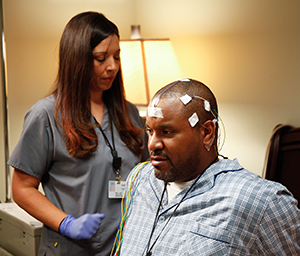A
B
C
D
E
F
G
H
I
J
K
L
M
N
O
P
Q
R
S
T
U
V
W
X
Y
Z
Click a letter to see a list of medical procedures beginning with that letter.
Click 'Back to Intro' to return to the beginning of this section.
Monitoring Your Sleep: Sleep Lab Testing
Checking your sleep during a nighttime sleep study is often the only way to find out if you have conditions such as sleep apnea or other sleep problems. A sleep study records how your lungs, heart, brain, and other parts of your body function while you’re asleep. It’s painless, risk-free, and in most cases, takes just one night.
Testing in a sleep clinic
If you spend the night in a sleep clinic, you will have a private bedroom. A technician will attach many sensors to your body, then go into another room. As you sleep, your heart rate, breathing, oxygen level, brain activity, and other functions will be tracked. A microphone and video camera will record your breathing sounds and body movements. The technician will keep watch nearby. You can contact them right away if you need something. If you need an air pressure device to help you breathe, one will be available.
 |
| During a sleep study, sensors track and record body functions. |
CPAP (continuous positive airway pressure) may be used if you have breathing problems. CPAP is a device that improves your sleep by helping you breathe. It adds mild air pressure to keep your airway passages open during sleep. You may need CPAP if you have sleep apnea. It may be used during the second half of your study or on another night.
Tips for testing in a sleep lab
-
Before your sleep study, bathe and wash your hair. Don’t use conditioners, oils, or makeup.
-
Stick to your normal routine. If you usually drink alcohol, exercise, or take medicine before bed, ask your healthcare provider whether you should do so the night of your study. Most people who have a sleep study done should take all of their medicines as they typically would at home. But it is best to check with your healthcare provider to confirm.
-
Bring your toothbrush, sleepwear, pillow, something to read, and anything else that will help you sleep well.
-
Before the testing starts, feel free to ask the technician any questions you may have.
Getting the results
The results of your sleep study need to be scored and interpreted. Once this is done, your healthcare provider will discuss the findings with you. The sleep study results will show whether you have sleep apnea or another sleep disorder. It can also tell how severe the apnea is. The findings help your healthcare provider know which treatment or treatments may be the right ones for you.
Online Medical Reviewer:
Andrew D Schriber MD
Online Medical Reviewer:
Jessica Gotwals RN BSN MPH
Online Medical Reviewer:
Marianne Fraser MSN RN
Date Last Reviewed:
5/1/2022
© 2000-2025 The StayWell Company, LLC. All rights reserved. This information is not intended as a substitute for professional medical care. Always follow your healthcare professional's instructions.